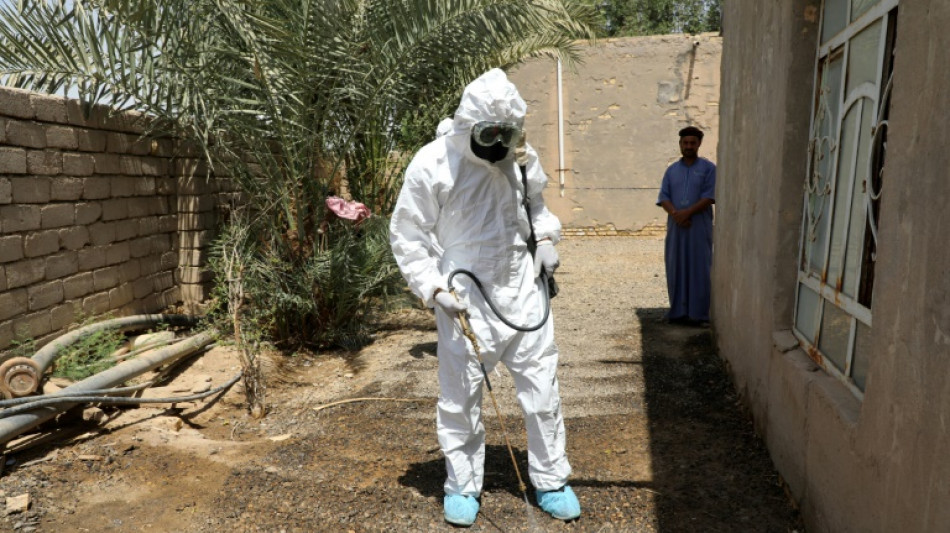
-
 Wales revel in being the underdogs, says skipper Lake
Wales revel in being the underdogs, says skipper Lake
-
German school students rally against army recruitment drive

-
 Wary European states pledge military aid for Cyprus, Gulf
Wary European states pledge military aid for Cyprus, Gulf
-
Liverpool injuries frustrating Slot in tough season

-
 Real Madrid will 'keep fighting' in title race, vows Arbeloa
Real Madrid will 'keep fighting' in title race, vows Arbeloa
-
Australia join South Korea in quarters of Women's Asian Cup

-
 Kane to miss Bayern game against Gladbach with calf knock
Kane to miss Bayern game against Gladbach with calf knock
-
Henman says Raducanu needs more physicality to rise up rankings

-
 France recall fit-again Jalibert to face Scotland
France recall fit-again Jalibert to face Scotland
-
Harry Styles fans head in one direction: to star's home village

-
 Syrian jailed over stabbing at Berlin Holocaust memorial
Syrian jailed over stabbing at Berlin Holocaust memorial
-
Second Iranian ship heading to Sri Lanka after submarine attack

-
 Middle East war spirals as Iran hits Kurds in Iraq
Middle East war spirals as Iran hits Kurds in Iraq
-
Norris hungrier than ever to defend Formula One world title

-
 Fatherhood, sleep, T20 World Cup final: Henry's whirlwind journey
Fatherhood, sleep, T20 World Cup final: Henry's whirlwind journey
-
Conservative Nigerian city sees women drive rickshaw taxis

-
 T20 World Cup hero Allen says New Zealand confidence high for final
T20 World Cup hero Allen says New Zealand confidence high for final
-
The silent struggle of an anti-war woman in Russia

-
 Iran hits Kurdish groups in Iraq as conflict widens
Iran hits Kurdish groups in Iraq as conflict widens
-
China sets lowest growth target in decades as consumption lags

-
 Afghans rally against Pakistan and civilian casualties
Afghans rally against Pakistan and civilian casualties
-
South Korea beat Philippines 3-0 to reach women's quarter-finals

-
 Mercedes' Russell not fazed by being tipped as pre-season favourite
Mercedes' Russell not fazed by being tipped as pre-season favourite
-
Australia beat Taiwan in World Baseball Classic opener

-
 Underdogs Wales could hurt Irish after Scotland display: Popham
Underdogs Wales could hurt Irish after Scotland display: Popham
-
Gilgeous-Alexander rules over Knicks again in Thunder win

-
 Hamilton reveals sequel in the works to blockbuster 'F1: The Movie'
Hamilton reveals sequel in the works to blockbuster 'F1: The Movie'
-
Alonso, Stroll fear 'permanent nerve damage' from vibrating Aston Martin

-
 China boosts military spending with eyes on US, Taiwan
China boosts military spending with eyes on US, Taiwan
-
Seoul leads rebound across Asian stocks, oil extends gains

-
 Tourism on hold as Middle East war casts uncertainty
Tourism on hold as Middle East war casts uncertainty
-
Bayern and Kane gambling with house money as Gladbach come to town

-
 Turkey invests in foreign legion to deliver LA Olympics gold
Turkey invests in foreign legion to deliver LA Olympics gold
-
Galthie's France blessed with unprecedented talent: Saint-Andre

-
 Voice coach to the stars says Aussie actors nail tricky accents
Voice coach to the stars says Aussie actors nail tricky accents
-
Rahm rejection of DP World Tour deal 'a shame' - McIlroy

-
 Israel keeps up Lebanon strikes as ground forces advance
Israel keeps up Lebanon strikes as ground forces advance
-
China prioritises energy and diplomacy over Iran support

-
 Canada PM Carney says can't rule out military participation in Iran war
Canada PM Carney says can't rule out military participation in Iran war
-
Verstappen says new Red Bull car gave him 'goosebumps'

-
 Swiss to vote on creating giant 'climate fund'
Swiss to vote on creating giant 'climate fund'
-
Google to open German centre for 'AI development'

-
 Winter Paralympics to start with icy blast as Ukraine lead ceremony boycott
Winter Paralympics to start with icy blast as Ukraine lead ceremony boycott
-
Sci-fi without AI: Oscar nominated 'Arco' director prefers human touch

-
 Ex-guerrillas battle low support in Colombia election
Ex-guerrillas battle low support in Colombia election
-
'She's coming back': Djokovic predicts Serena return

-
 Hamilton vows 'no holding back' in his 20th Formula One season
Hamilton vows 'no holding back' in his 20th Formula One season
-
Two-thirds of Cuba, including Havana, hit by blackout

-
 US sinks Iranian warship off Sri Lanka as war spreads
US sinks Iranian warship off Sri Lanka as war spreads
-
U.S. Polo Assn. Expands Collegiate Partnership Program to Record 70 Teams for 2026 Season


Deadly nose-bleed fever shocks Iraq as cases surge
Spraying a cow with pesticides, health workers target blood-sucking ticks at the heart of Iraq's worst detected outbreak of a fever that causes people to bleed to death.
The sight of the health workers, dressed in full protective kit, is one that has become common in the Iraqi countryside, as the Crimean-Congo haemorrhagic fever spreads, jumping from animals to humans.
This year Iraq has recorded 19 deaths among 111 CCHF cases in humans, according to the Word Health Organization.
The virus has no vaccine and onset can be swift, causing severe bleeding both internally and externally and especially from the nose. It causes death in as many as two-fifths of cases, according to medics.
"The number of cases recorded is unprecedented," said Haidar Hantouche, a health official in Dhi Qar province.
A poor farming region in southern Iraq, the province accounts for nearly half of Iraq's cases.
In previous years, cases could be counted "on the fingers of one hand", he added.
Transmitted by ticks, hosts of the virus include both wild and farmed animals such as buffalo, cattle, goats and sheep, all of which are common in Dhi Qar.
- Tick bites -
In the village of Al-Bujari, a team disinfects animals in a stable next to a house where a woman was infected. Wearing masks, goggles and overalls, the workers spray a cow and her two calves with pesticides.
A worker displays ticks that have fallen from the cow and been gathered into a container.
"Animals become infected by the bite of infected ticks," according to the World Health Organization.
"The CCHF virus is transmitted to people either by tick bites or through contact with infected animal blood or tissues during and immediately after slaughter," it adds.
The surge of cases this year has shocked officials, since numbers far exceed recorded cases in the 43 years since the virus was first documented in Iraq in 1979.
In his province, only 16 cases resulting in seven deaths had been recorded in 2021, Hantouche said. But this year Dhi Qar has recorded 43 cases, including eight deaths.
The numbers are still tiny compared with the Covid-19 pandemic -- where Iraq has registered over 25,200 deaths and 2.3 million recorded cases, according to WHO figures -- but health workers are worried.
Endemic in Africa, Asia, the Middle East and the Balkans, CCHF's fatality rate is between 10 and 40 percent, the WHO says.
The WHO's representative in Iraq, Ahmed Zouiten, said there were several "hypotheses" for the country's outbreak.
They included the spread of ticks in the absence of livestock spraying campaigns during Covid in 2020 and 2021.
And "very cautiously, we attribute part of this outbreak to global warming, which has lengthened the period of multiplication of ticks," he said.
But "mortality seems to be declining", he added, as Iraq had mounted a spraying campaign while new hospital treatments had shown "good results".
- Slaughterhouses under scrutiny -
Since the virus is "primarily transmitted" to people via ticks on livestock, most cases are among farmers, slaughterhouse workers and veterinarians, the WHO says.
"Human-to-human transmission can occur resulting from close contact with the blood, secretions, organs or other bodily fluids of infected persons," it adds.
Alongside uncontrolled bleeding, the virus causes intense fever and vomiting.
Medics fear there may be an explosion of cases following the Muslim festival of Eid al-Adha in July, when families traditionally slaughter an animal to feed guests.
"With the increase in the slaughter of animals, and more contact with meat, there are fears of an increase in cases during Eid," said Azhar al-Assadi, a doctor specialising in haematological diseases in a hospital in Nasiriya.
Most of those infected were "around 33 years old", he said, although their age ranges from 12 to 75.
Authorities have put in place disinfection campaigns and are cracking down on abattoirs that do not follow hygiene protocols. Several provinces have also banned livestock movement across their borders.
Near Najaf, a city in the south, slaughterhouses are monitored by the authorities.
The virus has adversely hit meat consumption, according to workers and officials there.
"I used to slaughter 15 or 16 animals a day -- now it is more like seven or eight," said butcher Hamid Mohsen.
Fares Mansour, director of Najaf Veterinary Hospital, which oversees the abattoirs, meanwhile noted that the number of cattle arriving for slaughter had fallen to around half normal levels.
"People are afraid of red meat and think it can transmit infection," he said.
T.Bondarenko--BTB




